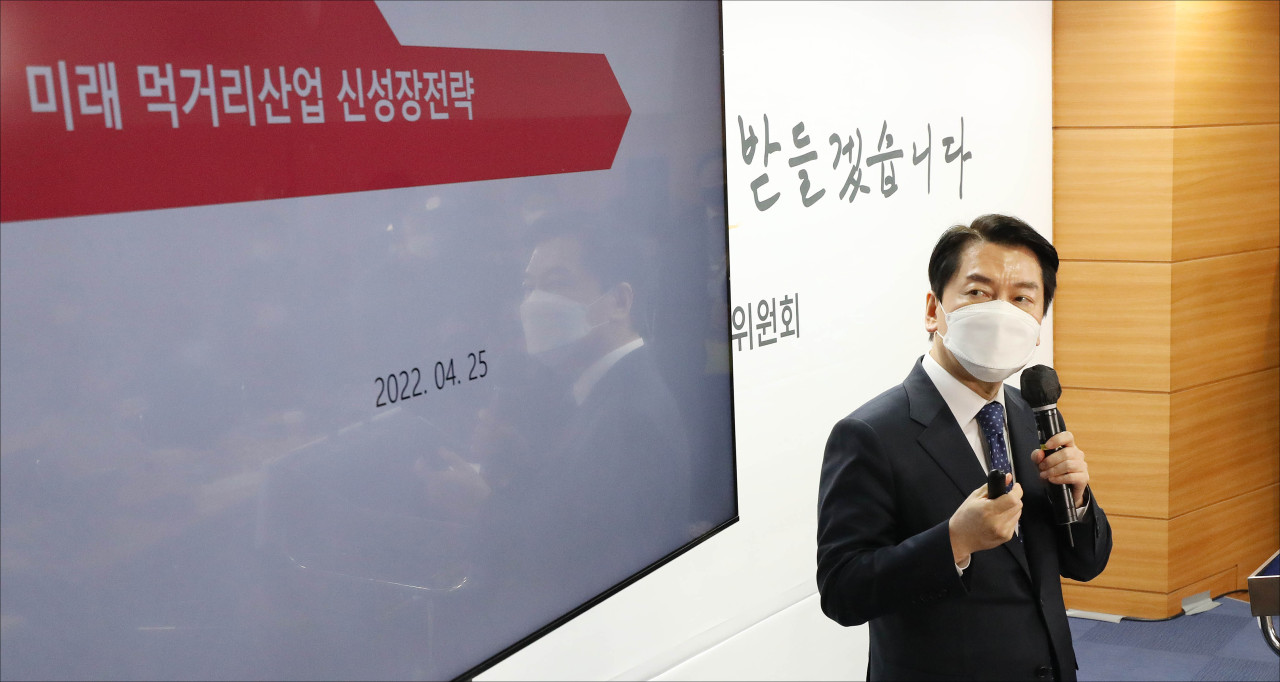
Expanding the high-tech sector will be the way to ensure sustainable economic growth, and the government will ease rules to make that happen, President-elect Yoon Suk-yeol’s transition team said Monday at a press briefing amid concerns over shrinking economic growth.
“Building on the high-tech sector involves two things: We help the existing industries go high-tech or go green and digital, because that leads to better products,” said Ahn Cheol-soo, the chief leading the team. “We also support already high-tech industries to sharpen that edge over global rivals.”
Ahn, who referred to a changing paradigm in the way goods and services are offered globally in a “green and digital” transition, said small and medium-sized businesses, which need help most to realize that, will receive it from the government, without elaborating on details.
Ahn said Korea has a long way to go before it outcompetes global rivals in what he described as six major high-tech industries: chips, displays, rechargeable batteries, mobile wireless networks, chemical products and core machinery used to support next-generation industries.
“The Yoon government will increase support for these sectors, including the chip industry, which is a cash cow,” Ahn said. Samsung Electronics is the world’s largest memory chip maker and the tech giant’s sister company, Samsung SDI, and crosstown rival LG Energy Solution are leading battery makers.
Providing bigger tax breaks for money spent on R&D and outside help that could ease supply chain bottlenecks is the priority, according to Ahn, who added that the Yoon government will also look into securing technologies to build smaller nuclear reactors and stronger rocket engines.
“Without the fear of a regulatory crackdown, companies will have greater freedom to run their businesses as they see fit, as long as they understand and face the consequences of their wrongdoing in doing so,” Ahn said.
He said the new strategy marks a major shift in the way the current Moon Jae-in government has dealt with the private sector for the past five years, describing the administration as preoccupied with “state-led, nonmarket policies and practices.”
“Building on the high-tech sector involves two things: We help the existing industries go high-tech or go green and digital, because that leads to better products,” said Ahn Cheol-soo, the chief leading the team. “We also support already high-tech industries to sharpen that edge over global rivals.”
Ahn, who referred to a changing paradigm in the way goods and services are offered globally in a “green and digital” transition, said small and medium-sized businesses, which need help most to realize that, will receive it from the government, without elaborating on details.
Ahn said Korea has a long way to go before it outcompetes global rivals in what he described as six major high-tech industries: chips, displays, rechargeable batteries, mobile wireless networks, chemical products and core machinery used to support next-generation industries.
“The Yoon government will increase support for these sectors, including the chip industry, which is a cash cow,” Ahn said. Samsung Electronics is the world’s largest memory chip maker and the tech giant’s sister company, Samsung SDI, and crosstown rival LG Energy Solution are leading battery makers.
Providing bigger tax breaks for money spent on R&D and outside help that could ease supply chain bottlenecks is the priority, according to Ahn, who added that the Yoon government will also look into securing technologies to build smaller nuclear reactors and stronger rocket engines.
“Without the fear of a regulatory crackdown, companies will have greater freedom to run their businesses as they see fit, as long as they understand and face the consequences of their wrongdoing in doing so,” Ahn said.
He said the new strategy marks a major shift in the way the current Moon Jae-in government has dealt with the private sector for the past five years, describing the administration as preoccupied with “state-led, nonmarket policies and practices.”









![[Today’s K-pop] BTS pop-up event to come to Seoul](http://res.heraldm.com/phpwas/restmb_idxmake.php?idx=644&simg=/content/image/2024/04/17/20240417050734_0.jpg&u=)
![[Graphic News] More Koreans say they plan long-distance trips this year](http://res.heraldm.com/phpwas/restmb_idxmake.php?idx=644&simg=/content/image/2024/04/17/20240417050828_0.gif&u=)







![[KH Explains] Hyundai's full hybrid edge to pay off amid slow transition to pure EVs](http://res.heraldm.com/phpwas/restmb_idxmake.php?idx=652&simg=/content/image/2024/04/18/20240418050645_0.jpg&u=20240419100350)

